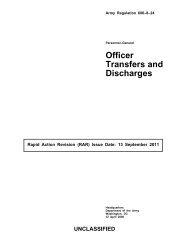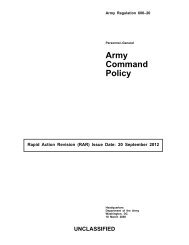Patient Administration - Army Publishing Directorate - U.S. Army
Patient Administration - Army Publishing Directorate - U.S. Army
Patient Administration - Army Publishing Directorate - U.S. Army
You also want an ePaper? Increase the reach of your titles
YUMPU automatically turns print PDFs into web optimized ePapers that Google loves.
the U.S. Government. This includes care or services furnished in or through an MTF, including emergency care<br />
provided to AD Soldiers in civilian hospitals at Government expense, services paid with supplemental funds, or care or<br />
services provided through the TRICARE Program. Health care services include, but are not limited to, inpatient or<br />
outpatient treatment, dental care, nursing services, high cost ancillary services or pharmaceuticals ordered by a civilian<br />
provider but provided by a military facility, ambulance services, durable medical equipment, prostheses or medical<br />
appliances, and home health care.<br />
f. Claim form. A completed DA Form 2631 (Medical Care-Third Party Liability Notification) (or automated<br />
equivalent) may be used as a claim form for medical affirmative claims. DA Form 2631 is available on the APD Web<br />
site (http://www.apd.army.mil/). MTFs may, with the agreement of the responsible RJA, use a completed UB-04 claim<br />
form in lieu of the DA Form 2631. The CMS 1450 (UB-04) claim form is a universal health care claim form and is<br />
used for Third Party Collection Program (TPCP) health insurance claims. Applicable ICD-9-CM and current procedural<br />
terminology (4th edition) (CPT4) codes will be entered on all claim forms.<br />
13–2. Interface and support<br />
MTFs are the primary source of information regarding potential or ongoing medical affirmative claims. Pursuant to a<br />
Memorandum of Agreement between TSG and The Judge Advocate General, MTFs must consider using a portion of<br />
the funds collected by the Office of the Staff Judge Advocate (OSJA) claims offices to offset some of the OSJAs costs<br />
of operating the medical affirmative claims program.<br />
a. MTFs will ensure patients are queried regarding how, when, and where all injury or illness occurred. MTFs will<br />
utilize existing TPCP procedures to the greatest extent possible to ensure pertinent accident and insurance information<br />
is obtained at point of entry or point of treatment. These procedures include, but are not limited to, pre-admission and<br />
admission interviews, and documentation of insurance declaration forms or TPCP clinic encounter forms. DD Form<br />
2569 (Third Party Collection Program/Medical Services Account/Other Health Insurance) will be completed on injury<br />
patients.<br />
b. MTFs and RJAs will implement procedures to ensure that the following are screened for potential recovery<br />
action: outpatient medical records and other outpatient documentation (for example, emergency room logs, physical<br />
therapy records, outpatient clinic encounter forms and records), inpatient records, requests for high cost ancillary<br />
services, pharmaceuticals ordered by outside providers, and supplemental care.<br />
c. Overdose injuries and self-inflicted injuries are not appropriate for initiation of an affirmative claim against an<br />
individual entitled to care in an MTF, but may be appropriate to assert a claim against an individual’s health insurance.<br />
d. In addition to automobile accidents, the following may be appropriate for initiation of an affirmative claim:<br />
(1) Traffic, airplane, or boating accidents.<br />
(2) Slip and falls.<br />
(3) On-premise accidents.<br />
(4) Job related or on-the-job accidents.<br />
(5) Product or equipment malfunctions or failures.<br />
(6) Medical malpractice by a civilian provider.<br />
e. Authority to collect for medical affirmative claims extends to AD Soldiers. Therefore, AD Soldiers must also be<br />
queried and their medical records reviewed for potential recovery action.<br />
f. MTFs will establish internal controls for the timely reporting of information regarding medical affirmative claims<br />
to the RJAs.<br />
g. The responsible RJA will provide to the MTFs—<br />
(1) A copy of medical affirmative claims deposit vouchers for collections deposited to an MTFs account; or<br />
(2) A monthly report containing relevant patient information including the patient’s name, sponsor’s name and SSN,<br />
dates of treatment, name of the insurer, and the amount(s) deposited to the MTFs account by the RJA for MTF referred<br />
affirmative claims; the date of deposit and voucher number; and<br />
(3) A list of the referring MTFs claims closed without recovery and claims transferred to another claims jurisdiction<br />
during the report month. This list must contain pertinent claimant and claim information.<br />
h. Different RJAs may deposit collections to an MTFs designated medical affirmative claim account (source code<br />
“937” account). The local RJA is not responsible for the tracking of claims or the deposit of money as a result of<br />
claims asserted and/or collected by other RJA offices.<br />
i. When care is rendered in more than one MTF to one or more Soldiers/persons involved in the same accident, and<br />
the RJA recovers less than the full amount of the Government’s claim, each MTF will receive a pro-rated amount.<br />
13–3. Notification procedures<br />
a. General. MTFs will establish and implement procedures to ensure RJAs receive timely notification of health care<br />
services provided to beneficiaries as a result of an accident or illness that may result in a medical affirmative claim.<br />
b. Inpatient care. A copy of the original admission record (DA Form 2985) or its equivalent will be used to notify<br />
the RJA of all patients with injuries or illnesses admitted either as a direct admission to an MTF, or those patients for<br />
82 AR 40–400 27 January 2010/RAR 15 September 2011
















